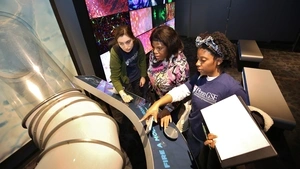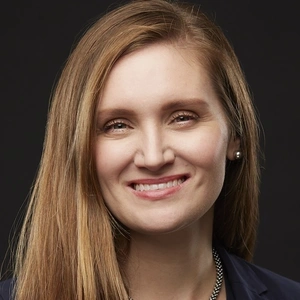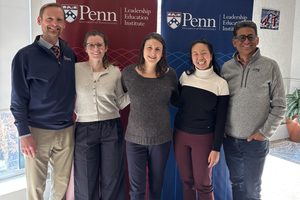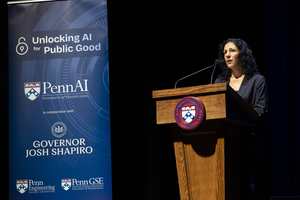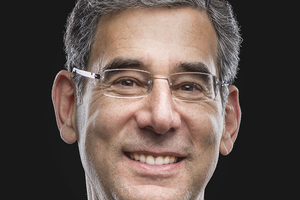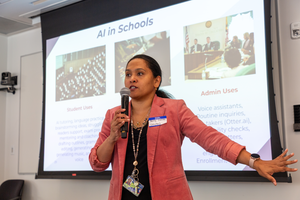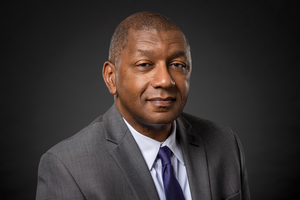Faculty Expert
-
Nicole Mittenfelner Carl
Director, Urban Teaching Residency Program
Learning, Teaching, and Literacies Division
In Penn GSE’s Urban Teaching Residency (UTR), educators take on an unusual dual role as teacher and student. The program offers educators committed to underserved communities opportunities to advance their careers while working full-time, integrating their research and studies at Penn GSE with hands-on practice in their school communities.
UTR is designed for first-year teachers, paraprofessionals, assistant teachers, or long-term substitutes looking to elevate their credentials. Participants can earn a Master of Science in Education and Pennsylvania general or special education teaching certification.
What sets UTR apart from traditional teaching programs is its hands-on approach, professional students, and a strong emphasis on equity, social justice, and anti-racism. Participants learn pedagogical approaches in their UTR courses in the evening and then can immediately apply ideas and strategies in their classrooms. At the same time, students bring real-world questions and anecdotes that have occurred in their school contexts into their UTR courses, making for richer discussions infused with practical experience.
“We’re focused on taking the art of learning to teach as close to the practice of teaching as possible,” explained UTR Director Nicole Mittenfelner Carl.
Originally created for Teach for America corps members seeking teaching credentials, the two-year program requires students to attend class one to two evenings per week, in person or virtually. Since 2017, UTR is open to all urban educators who are committed to teaching in the Philadelphia area.
Carl noted students collaborate by role-playing classroom scenarios, practicing strategies, and providing feedback. UTR students also film themselves teaching and review the footage with faculty and classmates, offering valuable insights for improvement.
Additionally, UTR students study child development, culturally responsive teaching, and the relationships between schools and society to deepen their understanding of their students, families, and Philadelphia communities.
“We think about what it means to be a teacher in Philadelphia and, in this context, how we can better support students from an asset-based perspective. It's infused in the program,” Carl noted.
Irene Chung, a second-year student earning her master’s and elementary education certification, noted that UTR’s theory-to-practice approach allows her to apply her learning immediately.
"It was important for me to work and pursue my degree simultaneously to obtain a real-world application, wherein my teaching experience further solidified my understanding of the UTR course content,” said Chung, who teaches seventh- and eighth-grade science at Folk Arts-Cultural Treasures Charter School.
While juggling full-time teaching and UTR is challenging, she said she “learned to multitask, manage commitments, and build discipline and resilience.”
UTR attracts a diverse population. About 50 percent of students identify as people of color; many participants are first-generation or come from low-income backgrounds.
In addition to core courses, UTR offers innovative opportunities to interact with students with diverse needs. For example, the VAST LIFE program provides social, educational, and experiential learning for youths with low-incidence disabilities ages 14 to 21.
Participants in Vast Life come to the Penn campus monthly and engage with custom lesson plans tailored to their needs and interests. UTR students plan a day of experiences, such as navigating public transportation, visiting Philadelphia landmarks, managing money, and dining in restaurants. Afterward, the UTR students present the experiences and lessons to the students’ families.
Students can also explore early childhood education through a partnership with St. Mary's Nursery School. UTR students study early childhood development, design developmentally appropriate lessons, and test the curriculum with St. Mary’s students during special Saturday sessions. It’s another way UTR students bring their classroom learning into the community.
That blend of traditional and experiential learning attracts students like Erika Feurtado, a kindergarten literacy teacher for KIPP Philadelphia Charter School Network in North Philadelphia.
“This program immerses teachers in urban communities with coursework directly relevant to understanding education within the specific areas we serve,” Feurtado said. “I wanted the firsthand experience of being in the classroom, where I could later implement education policies that benefit Black and Brown communities.”
As UTR grows, Carl says she’s working to strengthen alumni ties and participation. The program is using grant funding to launch alumni-run affinity groups. Leaders asked students to suggest groups and, in response, have created gatherings for Black, Latinx, Jewish, Asian American, parent, LGBTQ+, and first-generation students.
UTR alumni lead affinity groups and often serve as teaching assistants in UTR courses, deepening the connection between current and former students and strengthening the UTR alumni network in Philadelphia. Graduates are also recruited as professional coaches and mentors and invited to share their experiences in panel discussions hosted by UTR for current students and undergraduates interested in teaching.
Carl noted many UTR grads continue to work as classroom teachers while others go on to school and district leadership.
After graduation, Feurtado plans to teach kindergarten in Philadelphia and start a youth advocacy nonprofit organization.
“Recognizing the need for change in various parts of Philadelphia, I'm excited to live, work, and serve here, contributing to a community I care deeply about,” she said.
Media Inquiries
Penn GSE Communications is here to help reporters connect with the education experts they need.
